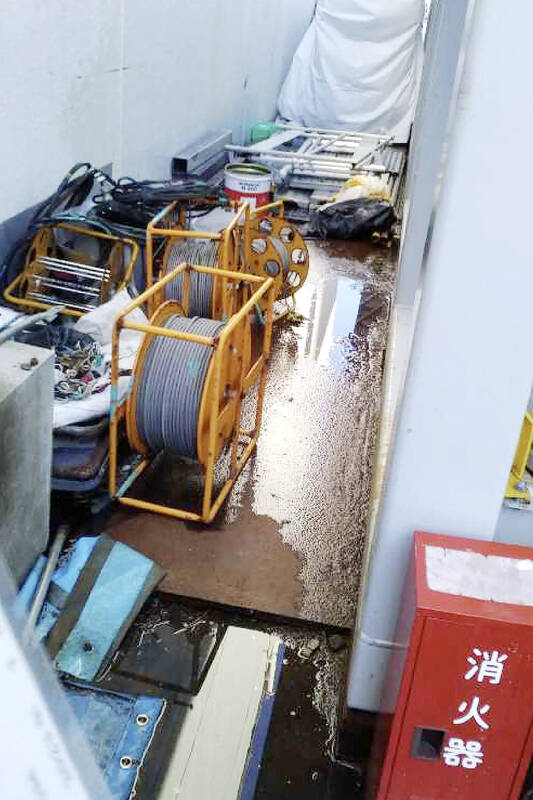An estimated 5,500 liters of radioactive water leaked from Japan’s stricken Fukushima Dai-ichi nuclear power plant but no sign of contamination has been detected outside the facility, its operator said yesterday.
A spokeswoman from Tokyo Electric Power Co (TEPCO) said that the leak was detected at part of the plant that processes contaminated water.
“We estimate that roughly 5.5 tonnes [5,500 litres] of water leaked” on Wednesday morning, but “there have been no significant changes” at posts monitoring radioactivity around the power station, she said.

Photo Tokyo Electric Power Co via AFP
Even so, TEPCO plans to remove soil from around the area that might have been contaminated, the spokeswoman said, without providing specific details on the location of the leaked water.
The Fukushima plant was wrecked by a huge earthquake and tsunami in 2011 that killed 18,000 people. It was one of the worst nuclear disasters in history.
The clean-up operation is expected to take decades, with the most dangerous part — removing radioactive fuel and rubble from three stricken reactors — yet to begin.
In August last year, Japan began gradually releasing into the Pacific Ocean 1.34 million tonnes of treated wastewater that had collected since the catastrophe, saying it is harmless and heavily diluted with seawater.
This view is backed by the UN atomic watchdog, but China and Russia have criticized the release and banned Japanese seafood imports.
Wednesday’s leak took place at a facility which processes the water before most radioactive elements are filtered out at a different, advanced facility known as ALPS.
TEPCO said the leak from a vent was spotted by a worker who was cleaning the vent before operating the facility.
“Vents should be closed during cleaning, but this time they were open,” the spokeswoman said.

‘ABUSE OF POWER’: Lee Chun-yi allegedly used a Control Yuan vehicle to transport his dog to a pet grooming salon and take his wife to restaurants, media reports said Control Yuan Secretary-General Lee Chun-yi (李俊俋) resigned on Sunday night, admitting that he had misused a government vehicle, as reported by the media. Control Yuan Vice President Lee Hung-chun (李鴻鈞) yesterday apologized to the public over the issue. The watchdog body would follow up on similar accusations made by the Chinese Nationalist Party (KMT) and would investigate the alleged misuse of government vehicles by three other Control Yuan members: Su Li-chiung (蘇麗瓊), Lin Yu-jung (林郁容) and Wang Jung-chang (王榮璋), Lee Hung-chun said. Lee Chun-yi in a statement apologized for using a Control Yuan vehicle to transport his dog to a

Taiwan yesterday denied Chinese allegations that its military was behind a cyberattack on a technology company in Guangzhou, after city authorities issued warrants for 20 suspects. The Guangzhou Municipal Public Security Bureau earlier yesterday issued warrants for 20 people it identified as members of the Information, Communications and Electronic Force Command (ICEFCOM). The bureau alleged they were behind a May 20 cyberattack targeting the backend system of a self-service facility at the company. “ICEFCOM, under Taiwan’s ruling Democratic Progressive Party, directed the illegal attack,” the warrant says. The bureau placed a bounty of 10,000 yuan (US$1,392) on each of the 20 people named in

The High Court yesterday found a New Taipei City woman guilty of charges related to helping Beijing secure surrender agreements from military service members. Lee Huei-hsin (李慧馨) was sentenced to six years and eight months in prison for breaching the National Security Act (國家安全法), making illegal compacts with government employees and bribery, the court said. The verdict is final. Lee, the manager of a temple in the city’s Lujhou District (蘆洲), was accused of arranging for eight service members to make surrender pledges to the Chinese People’s Liberation Army in exchange for money, the court said. The pledges, which required them to provide identification

INDO-PACIFIC REGION: Royal Navy ships exercise the right of freedom of navigation, including in the Taiwan Strait and South China Sea, the UK’s Tony Radakin told a summit Freedom of navigation in the Indo-Pacific region is as important as it is in the English Channel, British Chief of the Defence Staff Admiral Tony Radakin said at a summit in Singapore on Saturday. The remark came as the British Royal Navy’s flagship aircraft carrier, the HMS Prince of Wales, is on an eight-month deployment to the Indo-Pacific region as head of an international carrier strike group. “Upholding the UN Convention on the Law of the Sea, and with it, the principles of the freedom of navigation, in this part of the world matters to us just as it matters in the